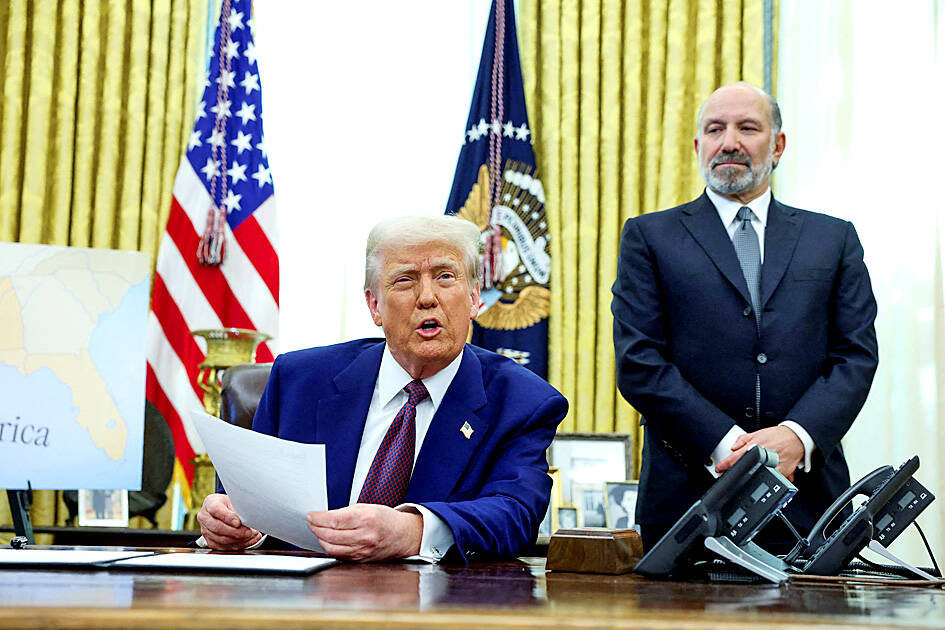Japan has asked to be exempted from the so-called reciprocal tariffs that US President Donald Trump plans to adopt this year as the Asian nation works to minimize any potential fallout.
Japanese Minister of Foreign Affairs Takeshi Iwaya sought the country’s exclusion from the tariffs when he met US Secretary of State Marco Rubio during the Munich Security Conference, according to a transcript of the meeting released on Saturday by Japan’s foreign ministry.
“I relayed my thoughts to Rubio that Japan should not be one of the countries subject to reciprocal tariffs,” Iwaya was quoted as saying.

Photo: Reuters
He also raised the issue of automobile tariffs and sought exclusion from the 25 percent tariff the US is to levy on imported steel and aluminum products.
The remarks followed Trump’s order to consider imposing reciprocal tariffs on numerous trading partners as soon as April, raising the prospect of a wider campaign against a global system he complains is tilted against the US. Trump has previously attacked Japan’s trade surplus with the US and yen weakness that feeds into that imbalance and recently singled out Japan, as well as South Korea, as nations that he believes are taking advantage of the US.
The Japanese government had begun communicating with Washington over tariff matters, Japanese Minister of Economy, Trade and Industry Yoji Muto told reporters on Friday.
The remark came as Trump said he would unveil new tariffs on automobiles.
“We are going to do that on around April 2,” Trump told reporters on Friday in the Oval Office, as he signed an executive order on energy policy.
The auto threat offers to put some of the biggest brands in Japan, Germany and South Korea in Trump’s crosshairs. Imports accounted for about half of the US auto market last year. About 80 percent of Volkswagen AG’s US sales are imported, while 65 percent of Hyundai-Kia’s US sales are imported, figures from market researcher Global Data showed.
Trump on Friday did not provide any details on the scope or rate of the potential auto levies. It is also unclear the effect they would have on vehicles built under the US-Mexico-Canada Agreement (USMCA), a free-trade agreement that Trump renegotiated during his first term. Auto production supply chains across North America are highly integrated.
The American Automotive Policy Council (AAPC) — which represents Detroit automakers General Motors Co (GM), Ford Motor Co and Stellantis NV — has called for Trump to drop proposed tariffs on Mexico and Canada.
“We support President Trump’s efforts to consider the entire global trade situation, including both tariff and non-tariff barriers,” AAPC president Matt Blunt said on Thursday in response to the announcement on reciprocal tariffs.
“In the meantime, Ford, GM, and Stellantis continue to believe that vehicles and auto parts that meet the USMCA requirements should not be subject to additional tariffs,” he said.
Additional reporting by AFP

Taiwan’s long-term economic competitiveness will hinge not only on national champions like Taiwan Semiconductor Manufacturing Co. (TSMC, 台積電) but also on the widespread adoption of artificial intelligence (AI) and other emerging technologies, a US-based scholar has said. At a lecture in Taipei on Tuesday, Jeffrey Ding, assistant professor of political science at the George Washington University and author of "Technology and the Rise of Great Powers," argued that historical experience shows that general-purpose technologies (GPTs) — such as electricity, computers and now AI — shape long-term economic advantages through their diffusion across the broader economy. "What really matters is not who pioneers

In a high-security Shenzhen laboratory, Chinese scientists have built what Washington has spent years trying to prevent: a prototype of a machine capable of producing the cutting-edge semiconductor chips that power artificial intelligence (AI), smartphones and weapons central to Western military dominance, Reuters has learned. Completed early this year and undergoing testing, the prototype fills nearly an entire factory floor. It was built by a team of former engineers from Dutch semiconductor giant ASML who reverse-engineered the company’s extreme ultraviolet lithography (EUV) machines, according to two people with knowledge of the project. EUV machines sit at the heart of a technological Cold

TAIWAN VALUE CHAIN: Foxtron is to fully own Luxgen following the transaction and it plans to launch a new electric model, the Foxtron Bria, in Taiwan next year Yulon Motor Co (裕隆汽車) yesterday said that its board of directors approved the disposal of its electric vehicle (EV) unit, Luxgen Motor Co (納智捷汽車), to Foxtron Vehicle Technologies Co (鴻華先進) for NT$787.6 million (US$24.98 million). Foxtron, a half-half joint venture between Yulon affiliate Hua-Chuang Automobile Information Technical Center Co (華創車電) and Hon Hai Precision Industry Co (鴻海精密), expects to wrap up the deal in the first quarter of next year. Foxtron would fully own Luxgen following the transaction, including five car distributing companies, outlets and all employees. The deal is subject to the approval of the Fair Trade Commission, Foxtron said. “Foxtron will be

INFLATION CONSIDERATION: The BOJ governor said that it would ‘keep making appropriate decisions’ and would adjust depending on the economy and prices The Bank of Japan (BOJ) yesterday raised its benchmark interest rate to the highest in 30 years and said more increases are in the pipeline if conditions allow, in a sign of growing conviction that it can attain the stable inflation target it has pursued for more than a decade. Bank of Japan Governor Kazuo Ueda’s policy board increased the rate by 0.2 percentage points to 0.75 percent, in a unanimous decision, the bank said in a statement. The central bank cited the rising likelihood of its economic outlook being realized. The rate change was expected by all 50 economists surveyed by Bloomberg. The